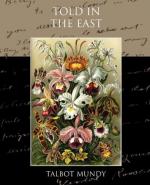“Once, and for all, Mahommed Khan, I will not have you torture him in here!”
“Memsahib, I have yet to ride for succor! At daybreak, when these Hindus learn that the guns will not come back, they will rise to a man. Even now we must find a hiding-place or—it is not good even to think what I might find on my return!”
He leaned over the priest again, but without the charcoal this time.
“Speak, thou!” he ordered, growling in Hindustanee through his savage black mustache. “I have yet to hear what price a Hindu sets on immunity from torture!”
But the priest, it seemed, had formed a new idea. He had been looking through puckered eyes at Ruth, keen, cool calculation in his glance, and in spite of the discomfort of his strained position he contrived to nod.
“Kharvani!” he muttered, half aloud.
“Aye! Call on Kharvani!” sneered the Risaldar. “Perhaps the Bride of Sivi will appear! Call louder!”
He stirred again among the charcoal with his tongs, and Ruth and the High Priest both shuddered.
“Look!” said the High Priest in Hindustanee, nodding in Ruth’s direction. It was the first word that he had addressed to them. It took them by surprise, and the Risaldar and his half-brother turned and looked. Their breath left them.
Framed in the yellow lamplight, her thin, hot-weather garments draped about her like a morning mist, Ruth stood and stared straight back at them through frightened eyes. Her blue-black hair, which had become loosened in her excitement, hung in a long plait over one shoulder and gleamed in the lamp’s reflection. Her skin took on a faintly golden color from the feeble light, and her face seemed stamped with fear, anxiety, pity and suffering, all at once, that strangely enhanced her beauty, silhouetted as she was against the blackness of the wall behind, she seemed to be standing in an aura, shimmering with radiated light.
“Kharvani!” said the High Priest to himself again, and the two Rajputs stood still like men dumfounded, and stared and stared and stared. They knew Kharvani’s temple. Who was there in Hanadra, Christian or Mohammedan or Hindu, who did not? The show-building of the city, the ancient, gloomy, wonderful erection where bats lived in the dome and flitted round Kharvani’s image, the place where every one must go who needed favors of the priests, the central hub of treason and intrigue, where every plot was hatched and every rumor had its origin— the ultimate, mazy, greedy, undisgorging goal of every bribe and every blackmail-wrung rupee!
They knew, too, as every one must know who has ever been inside the place, the amazing, awe-inspiring picture of Kharvani painted on the inner wall; of Kharvani as she was idealized in the days when priests believed in her and artists thought the labor of a lifetime well employed in painting but one picture of her—Kharvani the sorrowful, grieving for the wickedness of earth; Kharvani, Bride of Siva, ready to intercede with Siva, the Destroyer, for the helpless, foolish, purblind sons of man.




